Citius, Altius, Fortius! The Olympic Games and Stock Markets

With the XXXI Olympiad coming to a close in Rio de Janeiro, it’s a good opportunity to take a look at the effect of the summer games on global – and host country – stock market performance during the Games and moving forward.
There are a lot of common themes between the Olympic games and equity investment: both are strongly based around strategy, investment and narratives of winners and losers. Let’s take this juxtaposition further and quickly examine the relationship between the greatest show on earth and a potential recurring investment opportunity. Research shows that host country equities have historically seen rising prices during the Games as well as in the year following the closing ceremony.
In an economic paper, Dick and Wang (2008) argued that, on average, local stock markets are positively affected by Olympic host announcements. The Games generate economic impacts via enhancing the international profile of the host country, leveraging tourism and FDI as well as the significant public and private investment in sporting, logistics and transport infrastructure (the Rio price tag is estimated at around R$ 40B BRL, ballooning almost 200,000% since the first modern Games were held in 1896).
Over the last eight Summer Olympics, starting from the Los Angeles Games in 1984, the principal stock index of the host country increased in value six out of eight times during the Games, based on data from Factset, averaging an uptick of 1.74% (median 2.32%) from the two-week opening ceremony to closing ceremony.
Jumping back to Rio, even after a robust performance since the start of the year (YTD +37%) driven by an (whisper it) improving political and economic outlook and rising commodity prices, the Brazilian Bovespa is up 2.9% since the since the Olympic opening ceremony (by 17 August). With the final decision on the long running presidential impeachment saga expected this month or in early September, further upside – ROI in RIO? – is possible. For long-term bets on the country´s macro direction check out these Brazilian ETFs.
Indeed, over the same timeframe only the 2000 Sydney Games (S&P ASX 200 down 0.9%) and the 2008 Beijing Games (SSE Composite down 7.7%) saw domestic equity losses. However, in mitigation, both events took place during the backdrops of the Dot.com crash and the Global Financial Crisis.
Looking ahead, seven of these eight countries experienced an average upside in the 12 months following the Games of almost 24% (with the exception of Australia) as well as broader GDP gains (again with the exception of Australia and also Spain) compared to increases of just over 10% in the MSCI World Index. Since 1992 the average return over the following year has more than halved to 9.91%. Nevertheless, all recent Olympic hosts have outperformed the MSCI World index in the 12 months following the Olympics.
Based on data from Andrew Birstingl, after global share rallies during the Games, markets seem to decline in the first three months after the closing ceremony. We then tend to see the largest alpha returns in both the S&P and local indexes generated in the period of 3-12 months after the conclusion of the Games. Furthermore, based on recent history, local stocks seem to underperform in the months leading up to the Olympics when negative news flow around budget excesses, delays and lack of public enthusiasm are common.
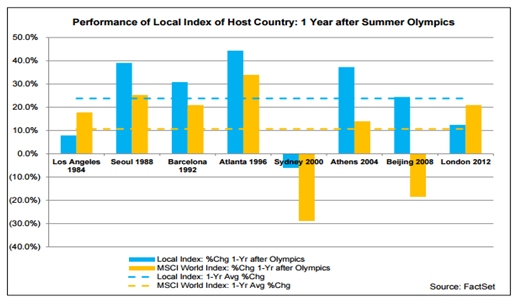
The “Olympic Effect” is not just constrained to the host stock market either. Research has shown that the Dow Jones Industrial Average (DJI) has increased on average by 1.8% during 67% of the Summer Olympics (stripping out those historic games of more than two weeks).
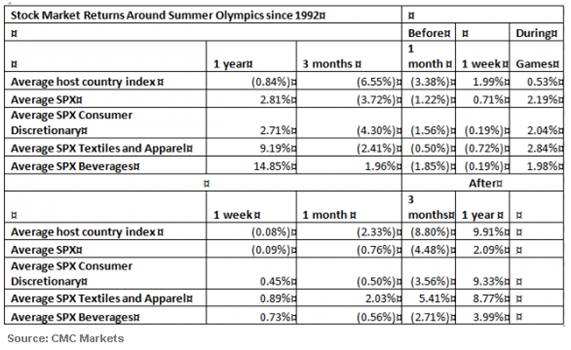
In addition to the athletes, medals and world records, the Olympic also provides a key opportunity for major companies and sponsors to promote their brands and products to one of the largest global audiences. Since the 2000 Sydney Games, four major companies – Panasonic (TYO: 6752), McDonald’s (NYSE: MCD), Coca-Cola (NYSE: KO), and Samsung (OTC: SSNLF) – have been consistent Olympic marketing partners and have on average outperformed the MSCI World Index during the event and also, with the exception of Coke, 12 months after the closing ceremony (Factset). Moreover, according to CMC Markets, leading sectors in focus during the event, such as consumer discretionary, apparel (sports clothes and shoes) and beverages (beers and soft drinks), also see broader upside pressure in the run up to and during the Olympics.
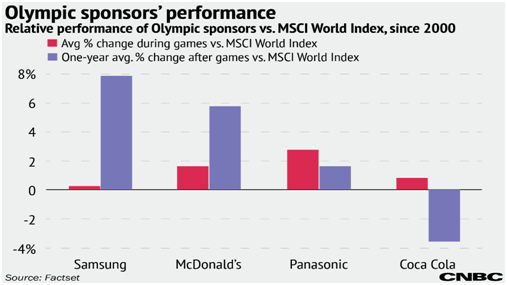
Looking ahead to the 2020 Tokyo Games (announced in Sep/2013), data from Goldman Sachs shows that over the six to seven years between the announcement and the opening ceremony of the Games, “the equity markets in China, Korea, the US and Greece outperformed leading up to the Olympics, whereas those in Spain, Australia, and the UK underperformed”. However, they also flag up that the latter three markets were also impacted from global cycle headwinds in the run up to those Olympics. The average monthly return was estimated at around 0.2%.
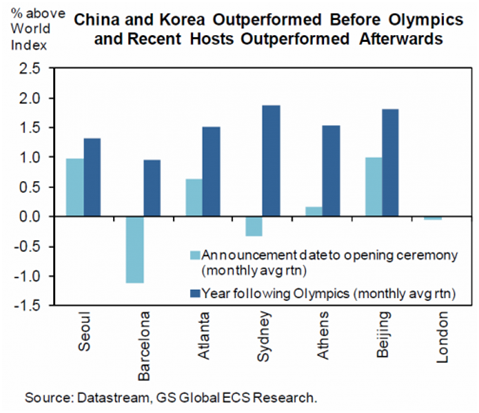
Beyond potential equity impacts, Goldman Sachs also mapped out an interesting study on whether the Games affected Forex markets. They modeled a proxy “Olympic currency” by combining their proprietary Real Trade Weighted FX Indices (GS RTWI) of the host countries. They found that – with key caveats – the Olympic RTWI gained around 90% since the end of the Moscow Olympics in 1980, which was higher than any economically stable individual currency over this period. Starting with $100 in 1980, the Olympic investment by 2012 (when held in Sterling) was worth about $1,020. In comparison, investing $100 in rolling 1-year USD investments would have returned only about $700.
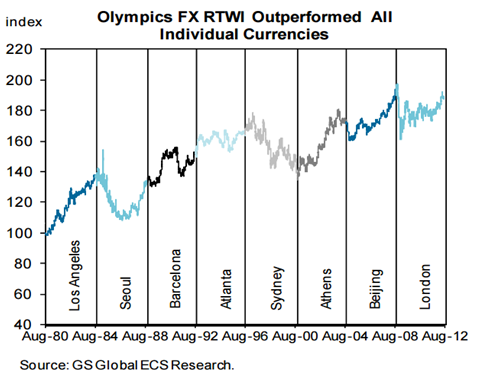
The Olympic Games as a fillip for positive stock market performance is certainly an interesting trading idea. The Games can potentially influence stock returns and pricing over the near term, but as statistics 101 states, correlation doesn’t necessarily signify causation. As always, for strategic investment plays, growth needs to be backed up by a structural narrative that lasts longer than just one Olympic cycle.
Comments (0)